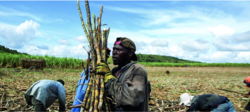BNN | 8 February 2024
Nigeria secures new investors to boost sugar production by 20,000 hectares
The National Sugar Development Council in Nigeria has secured new investors to expand the sugar industry by an impressive 20,000 hectares. This development is a part of the council's successful implementation of the Nigerian Sugar Masterplan, aiming to make Nigeria self-sufficient in sugar production and maximize its by-products, such as ethanol, power, and animal feeds. The council is also revitalizing the Nigerian Sugar Institute in Kwara state to produce 2 million seedlings to support the industry's growth.
by Nasiru Eneji Abdulrasheed
In a significant stride towards self-sufficiency in sugar production, Nigeria's National Sugar Development Council (NSDC) has secured the commitment of two new investors, expanding the industry's footprint by an impressive 20,000 hectares. This development, announced by the NSDC's Executive Secretary, Mr. Kamar Bakrin, in Abuja, is a testament to the council's successful implementation of the Nigerian Sugar Masterplan (NSMP).
Bakrin's presentation to the Commerce and Industry Correspondents Association of Nigeria (CICAN) underscored the council's strategic efforts to realign incentives within the sugar sector. This realignment aims to boost performance and ensure adherence to the objectives of the NSMP.
Revitalizing the Nigerian Sugar Institute
A key aspect of this revitalization strategy is the ongoing rejuvenation of the Nigerian Sugar Institute in Kwara state. The institute is poised to produce a staggering two million seedlings to support the sugar industry's development in the region.
The NSMP, initiated in 2012, is built on four policy pillars: backward integration, fiscal incentives, project intervention, and performance management. These pillars are designed to make Nigeria a globally competitive sugar producer, maximizing the sector's by-products, including ethanol, power, and animal feeds.
Redesigning the Performance Incentive Framework
As part of the NSMP's implementation, the council has restructured the Backward Integration Performance Incentive Framework. This new framework rewards or penalizes operators based on their performance, ensuring a robust and accountable sugar industry.
This redesign is a reflection of the council's commitment to driving more investment into the sugar sector. It is also a testament to the council's dedication to creating an enabling environment for sugar production in Nigeria.
A Triad of Strategies for Sugar Sector Growth
Under the NSMP, the council has identified three strategies to grow the sugar sector. These strategies include promoting backward integration, becoming a globally competitive player, and maximizing the output of the industry.
By promoting backward integration, the council aims to increase local sugar production and reduce the nation's reliance on imported sugar. This strategy also seeks to create jobs and stimulate economic growth in rural communities.
The second strategy, becoming a globally competitive player, involves investing in modern technology and infrastructure. This investment will enable Nigeria to produce high-quality sugar that can compete in the international market.
The third strategy, maximizing the industry's output, involves increasing the amount of land available for sugar production. This expansion will enable Nigeria to produce more sugar and maximize the sector's by-products, including ethanol, power, and animal feeds.
With these strategies in place, Bakrin expressed confidence in the council's ability to drive more investment into the sugar sector. He also reiterated the council's commitment to making Nigeria self-sufficient in sugar production.












